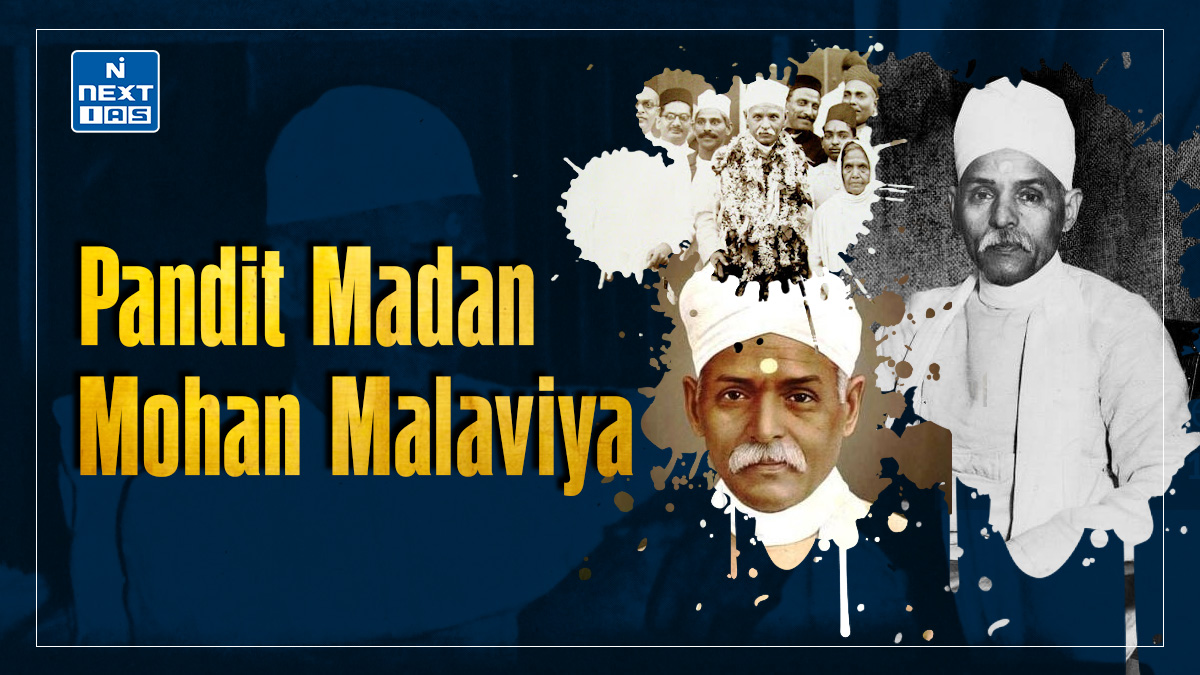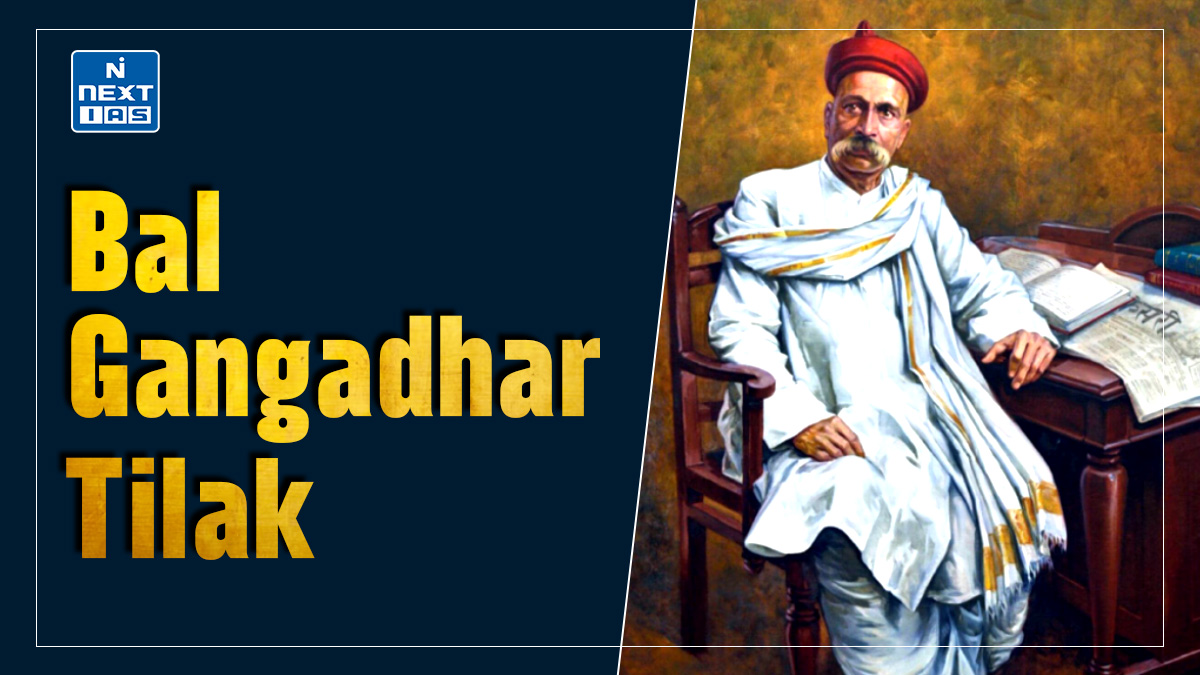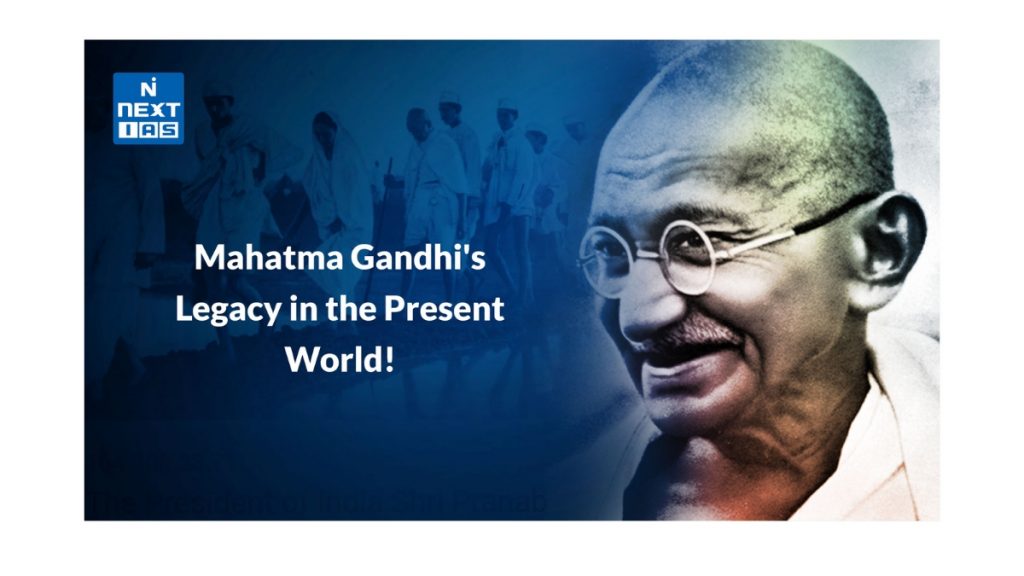
The ideas of Mahatma Gandhi are gaining increasing relevance on a global scale. People all around the world are seeking solutions to their problems by turning to Gandhi’s teachings. It has become clear that wars do not offer any solutions to problems, and violent revolutions have proven to be ineffective. Over time, it has become evident that Satyagraha (the practice of nonviolent resistance) and Non-violence are the most effective paths to follow.
Whether it is individuals, institutions, or nations, there is now a growing belief that there are better alternatives and more humane ways to express dissent and register protest for the welfare of the human race.
Master Key of Peace
- Gandhi, indeed, considered “Economic Equality” as the “Master-Key” to non-violent world order. Peace must have its roots in fraternity rather than in fear. He regarded that global peace could not be possible unless the present world social order is replaced by a new social order that would be committed to non-violence and exploitation free social order.
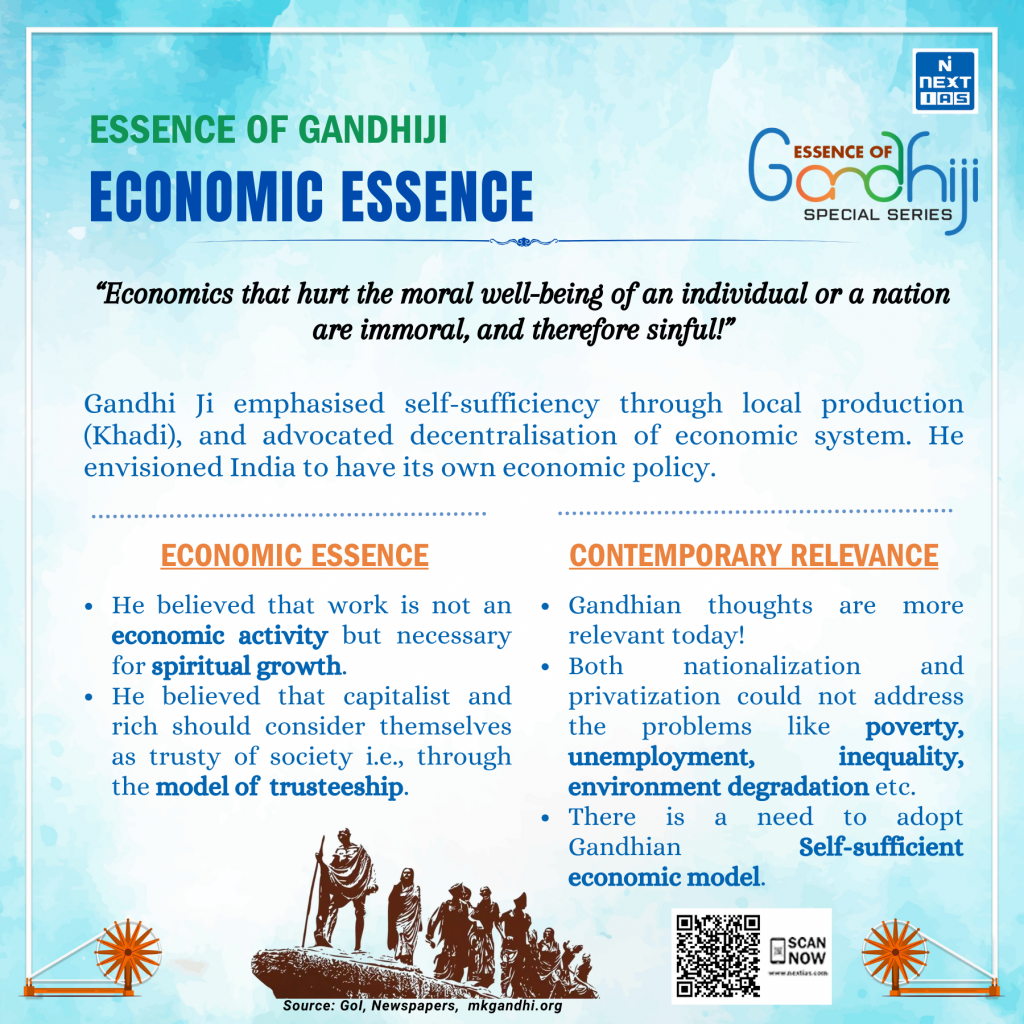
Gandhi’s Environment Perspective
- Environmental protection is increasingly becoming a top priority in the world. Intellectuals and activists around the world are taking to the streets in response to the worsening environmental conditions and climate change. Although the term “Environment” was not in vogue during Mahatma Gandhi’s lifetime, he expressed concerns about the future. Gandhi believed that –
“There is enough on earth for everybody’s need but not enough for everybody’s greed.”
- In his article, “Swasthya ki Kunji,” or “Key to Health” he shared his views on the importance of clean air. Gandhi stated that while air, water, and food are all essential natural resources but clean air holds the utmost importance. He further inspired Indians to spin yarn using the charkha and wear hand-woven clothes. This objective aimed not only to foster a sense of swadeshi (self-reliance) but also to reduce overall waste, particularly from textile mills.
Gandhi’s Concept of Environmental Sustainability
- Gandhi was an economist of masses and an environmentalist without any structured model. Although he did not give structured model of environmental conservation and sustainable development, interlinking all his thoughts together, environmentalist get his logically built up environmentally sustainable development model.
- His sustainable development is based on a holistic paradigm which lays stress on all round development of individual and society in relation with nature. This entire thinking was based upon the ethical vision in which the individual is at a central position.
- In Hind Swaraj 1909, he talked about the dangers of unplanned and reckless industrialization. Further, the growth oriented theory must be replaced by theories of sustainable development that will not damage but will guarantee harmonious co-existence of man and the ecosystem.
- Sustainable development is an ideology, drawn at the global level, showing human beings are interrelated with the ecosphere. It is a movement as it suggests a way of life. It involves the active participation of all the members of society. Self-help, self-reliance, decentralization of industries and labour intensive technology; these are the qualitative goals of satisfying meaningful life.
- Gandhi used the phrase, ‘Economy of Nature’ which brings out the sensitivity and deeper understanding of human actions vis-a-vis ecology.
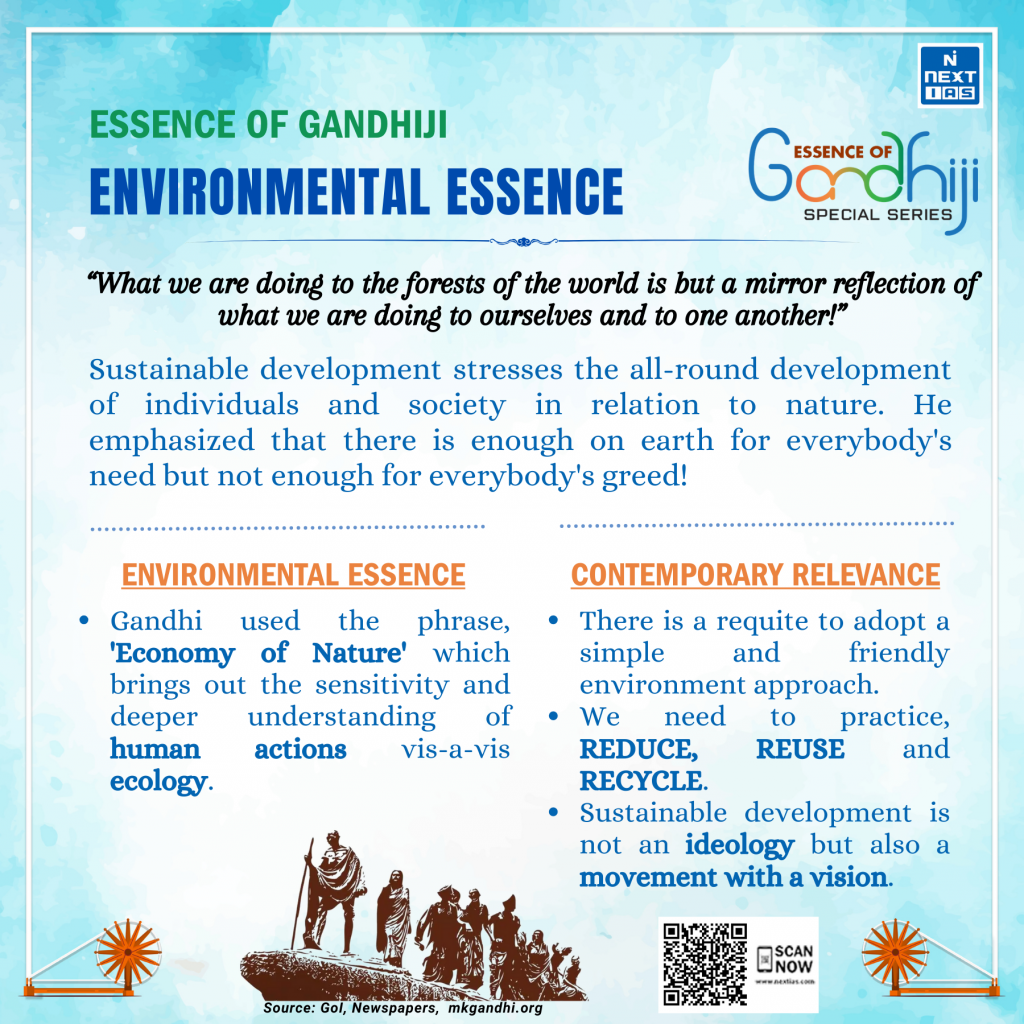
Humanity: (Principal of Sarvodaya)
- Gandhi believed in Sarvodaya and therefore the welfare of all was the basis of his thinking. Hence his community centred approach towards sustainability emphasized on ‘betterment of human life’ and ‘ensuring fulfilment of basic needs of all human needs‘. Welfare of the human beings the ultimate goal by avoiding all sorts of exploitations, Gandhi felt that human dignity needs to be established.
Gandhi pleaded for decentralization of power in society. He visualized:
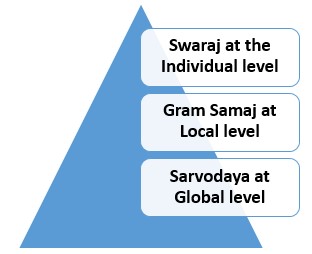
He believed that power resided in the people. A mutually interdependent cooperative working at the world level helps in making noble environment with human wellbeing.
- His trusteeship concept is for Sarvodaya. Every member of the society is the trustee of the wealth generated out of the collective efforts of all. Thus, it denies individual pursuit and collection of wealth and converts it into the wealth of all for a better society. He expected that the trusteeship will result into non-violent and non-exploitative socio-economic relations and development models based on production systems centred around the preservation of nature.
Gandhi on Women
- Gandhiji called women as the noble sex. He said that if she is weak in striking, she is strong in suffering. Gandhi described; “Woman as the embodiment of sacrifice and ahimsa.” He further states “A daughter’s share must be equal to that of a son. The husband’s earnings are a joint property of husband and wife as he makes money by her assistance.”
- In 21st century, it is the call of the time to realize that discrimination, crime against women and gender bias would always lead to violation of the human rights of women and become barrier for women empowerment.
- Hence it is high time to follow and remember the golden words of Mahatma Gandhi. If his principle of non-violence is followed by all nations, the discrimination against women will get reduced and where there is no discrimination, there won’t be any need to empower women. And this would automatically lead to the creation of a just society based on equality and justice.
Collectivism – World as one family
- For Gandhi, the interests of the group are of high importance. He believed that the needs of the community and the service of the poor should always override every selfish or individual interest.
- Although, its relevance can be seen in India’s G20 presidency where India sees the world as one family, not as disparate entities defined by geographical boundaries, bound by a goal towards the greater common good. When the family progresses, each member also advances, leaving no one behind.
Gandhi successfully demonstrated to a world, weary with wars and continuing destruction that adherence to Truth and Non-violence is not meant for individual behaviour alone but can be applied in global affairs too. To the Indian people, Gandhi gave a nation. To the world, he gave Satyagraha, arguably the most revolutionary idea of a long and ravaged century.
He drew this lesson from his readings of the Bible and Tolstoy and the ‘Bhagavad-Gita’, and he taught it to many world leaders and countless other leaders who would follow his example in the years to come.
In some sense, Gandhi’s greatest achievement lay in his legacy; for his ideals, and the example he provided in living them out, inspired, and continue to inspire, people of all nations to take up the peaceful struggle for freedom from oppression.
Related Articles:
- Mahatma Gandhi, a Management Icon of 20th Century!
- Indian Societies – Through the Eyes of “Mahatma Gandhi”
- Mahatma Gandhi, as a ‘Political Guru’ in the New Millennium
References:
- https://www.gandhiashramsevagram.org/gandhi-articles/gandhiji-and-the-world.php
- https://www.gandhiashramsevagram.org/gandhi-articles/the-gentle-revolutionary.php
- https://www.gandhiashramsevagram.org/gandhi-articles/gandhi-and-globalisation.php
- https://www.gandhiashramsevagram.org/gandhi-articles/gandhi-globalization-and-quality-of=life.php
- https://www.un.org/sg/en/content/sg/statement/2019-09-24/secretary-generals-remarks-the-event-leadership-matters-relevance-of-mahatma-gandhi-the-contemporary-world-delivered
- https://www.mkgandhi.org/articles/international_peace.html




